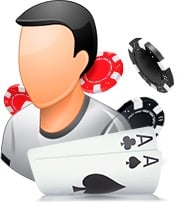Types Of Poker Players Online

No matter what variation of poker you play, you’ll need to get intimately familiar with the rules. While the formal guidelines and regulations that govern play are critical, the cardinal rule of poker might just be to know your opponent. Who you are playing against and how you react are both critical to your success.
Luckily you don’t need a Master’s degree in Psychology to get a handle on the competition. Did you know there are only a handful of player personalities? We’ll show you who they are, how to spot them, and how to beat them. Put success firmly in your hands rather than in the hands of your tablemates.
Donks and Fish
Shorthand for donkey, donks are inexperienced, inept, and often outright idiotic, at least in their playing style. Sometimes they’ll place bets seemingly out of nowhere. Other times they’ll bet excessively when the board cards make it obvious that their hand is garbage. They’ve been known to go all-in before the flop for no discernable reason.
Donks are easy to beat once you identify them. They treat poker like a gambling game of pure chance, ignoring all elements of sound skill. Since donks tend to bet like they’re holding four of a kind when they’re actually chasing a flush, you need to play aggressively when you have a good hand. If you bet a lot and frequently, they’ll likely follow your lead without the cards to match.
Keep in mind that even experienced players defy poker etiquette by making donk bets to foil their opponents on occasion. New and inexperienced players are also referred to as fish.
Pros and Sharks
Poker pros and sharks have the skill, experience, and discipline to win. What makes these players stand out isn’t just their winning track record but also their ability to adapt their play on a whim. They know how to make the most of every hand and deceive their opponents in the process.
You can’t expect to beat pros with any regularity, but you can aim to become one. If you stick to smaller stakes tables, you probably won’t run into too many pros outside of tournaments.
Small World. Big Winners.
Although there are millions of poker players online across the globe, you shouldn’t be surprised when you keep running into the same players over and over. We’re not just talking about similar predictable personalities either. Your paths will cross with players you know, have beaten, and chatted with.
The secret to success is to use past experiences to your advantage. Keep notes while you play and refer to them whenever you run into past players. Use a spreadsheet or take advantage of the player notes feature available in many game clients.
Grinders
Grinders are the inefficient machines of the poker world. They play often and for long periods of time but their haul is hardly impressive when you consider their effort. These semi-pros usually play low limit games successfully. They tend to lose when the stakes are higher, which is why they are stuck grinding. These people shouldn’t quit their day job but they may already have. If you avoid microstakes tables, you can avoid these robotic clowns.
Rocks
Rocks tend to just sit there unless they have an amazing hand. It doesn’t get more risk averse than a rock. If a rock starts raising, you would expect his pocket cards to be at least a pair of queens. These guys rarely bluff, so proceed with caution unless your hand is strong and then some.
Regs
Regs are the regulars at any poker room. They have enough skill to win and keep coming back. They tend to get comfortable with their current games and stakes. Regs may be unique but they are easy to crack since you’ll get to know them. You can also avoid the ones you’ve identified as a threat.
A-B-C Players
A-B-C players always play exactly by the book. If you’ve read chapter one of the metaphorical book then you’ll have no trouble predicting their every move. They know when to raise and by how much. A-B-C players are easy to exploit once you indentify them and get aggressive.
Drunks and Maniacs
Nobody likes non-stop aggression yet it happens to be the main tool of drunks and maniacs. These people are intoxicated or clinically insane, but their play might indicate otherwise. They tend to play almost every hand. They’ll even raise repeatedly no matter what card they happen to have. The key to beating these players is to spot them and keep calm. You can count on bigger pots when there’s a maniac at your table.
Rating Your Opponents
All these labels can be a lot to swallow. Ultimately you should aim to rate players by how loose or tight they play their starting hands. At the same time it’s critical to examine how passive or aggressive they are in terms of betting. Together these two pieces of data are more valuable than a thousand labels. In general your opponents will either be tight-passive, loose-passive, tight-aggressive, or loose-aggressive.
Tight-Passive Players
These are similar to the rocks we discussed earlier. They tend to only play strong hands and even then betting and raising are rare. Exploit this conservative style of play by placing a bet whenever they check. They’ll usually fold.
Loose-Passive Players

Loose-passive players are often referred to as calling stations since they almost always check or call. It’s rare to see these players raise or fold no matter what their cards are. As a result it’s hard to gauge the quality of their hand. If loose-passive players do raise, you can be almost certain that they have the nuts.
Tight-Aggressive Players
Tight-aggressive players are disciplined and successful. As the name implies they primarily play quality hands and play them forcefully. Ideally you should aim to avoid these players, especially when you are new to the game. Find another table or target looser players altogether. Ultimately you should aim to master this playing style.
Loose-Aggressive Players
Loose-aggressive players are in it, and not necessarily to win it. They play almost every hand and are liberal when it comes to raising. These are the maniacs we warned you about earlier. Again, you can beat them by identifying them and being disciplined in your play.






